I have been travelling in
Normandy this week, mostly in the Perche region between Chartres and Le Mans.
The local peasants – and the Perche is the very heart and centre of peasant
farming in the North – are making a great deal of their opposition to the Common
Agricultural Policy this year. Their argument is, of course, that the CAP (which
they call the PAC, Politique Agricole Commune), which was once the great
defender of the small farmer, now looks set to drive him out of business.
The roads all over Normandy
are lined with hand-painted boards bearing a number of slogans revealing great
variety in the educational standards of their writers. On one road, 'Touches pas
au paysan' (hand zoff the peasants) was followed by 'NON à la désertification du
milieu paysan' (say no to the desertisation of the peasant-farming economy). One
of the best and commonest is 'PAS DE PAYS SANS PAYSANS' (you can't have a
country without countryfolk), and many concentrate on the idea that the removal
of peasants produces desert. On Monday the local roads were clogged by a long
but peaceful procession of tractors doing their local bit to cause disruption.
One can't help feeling, of course, that the farmers who plan to use 50,000
tractors to block the approach roads to Paris will cause more disruption than
those who held me up for five minutes between Nogent-le-Rotrou and
Thiron-Gardais; but the farmer next door tells me it's the weather-man's fault;
he keeps predicting thunderstorms, and no-one will venture far from home when
there's hay to get in.
The next day, however, some of them had ventured as far as Alençon,
administrative centre of the Département of the Orne, where they had blocked one
of the streets leading to the town centre and were giving away roast beef and
cider to demonstrate that they might as well give as accept the new prices. Vast
tractors were parked at the foot of the War Memorial, two French flags whipping
in the breeze above the banners with the same slogans as those by the roadsides,
plus a rather neat one reading 'Mitterrand, Maastricht, Mensonges'- the last
word meaning lies. They were also handing out what at first I thought was a
sheet of slogans, but which turned out to be a page of statistics. Since the
war, four million jobs have been lost in French agriculture; in the last three
years 112,000 farms have disappeared. You can't really blame these people, who
produce nearly a quarter of the EC's farm output, for feeling insecure.
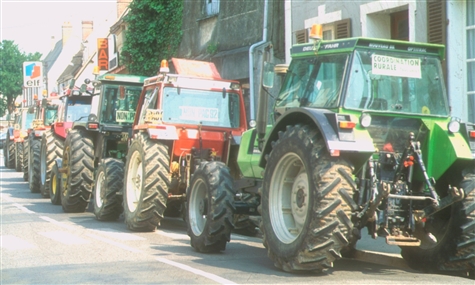
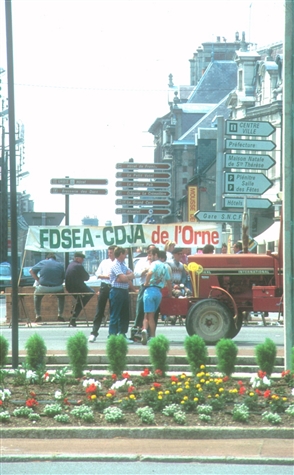
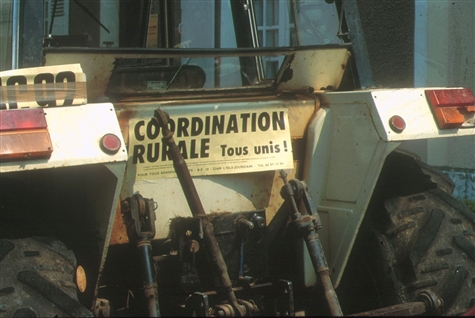
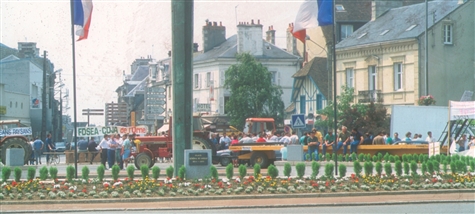
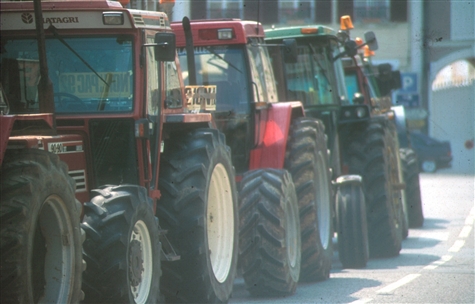
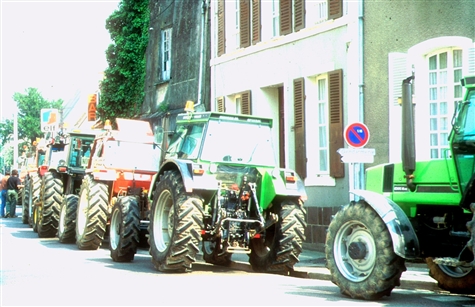
The hay will be in by the weekend, my neighbour tells me, and then they have
just a week before the corn harvest. They're already on the road to Paris, many
of those tractors already in place, hidden in barns and fields ready for the big
blockade. Headquarters has been established at Chartres, and on Monday night
they'll start to block every road to Paris.
And what good will it do them, I ask my neighbour. He shrugs. He's a French
farmer, and they get good at shrugging. All very well to block a road, he says,
but what happens when the riot police come along with bulldozers and wreck your
tractor? Think the insurance will pay up? How are you going to feel the next
morning, alone with a heap of scrap iron a hundred miles from home? And with a
harvest to get in? Sure, the CAP is a vicious imposition; yes, it's insane to
pay people to leave their fields fallow when the world is starving; but what
sort of person will risk his own livelihood to protest when he knows it won't do
any good?
I'll tell you what sort of person, says my Norman farmer, the ones with no hope,
the ones already deep in debt, the ones with a few acres fit only for pasture;
the ones with nothing to lose. Oh, and a few who work on big farms and have been
sent along by their employers with the oldest tractor, paid to get bashed by the
police while the boss sits in the restaurant. One of those big landowners turned
up at a demonstration the other week, and he was lucky not to be lynched.
My neighbour himself is all right. He has ninety acres about an average farm in
France and went heavily into free-range hens ten years ago, just ahead of the
fashion. He won't be demonstrating, he won't be giving chickens away, he'll be
at home as usual, doing the best he can. Which, the EC being what it is, is
probably the sanest reaction.
For those travelling in France this summer, a few more field slogans:
PAC 92 mort des campagnes – CAP 92 the death of the countryside.
Mitterrand fossoyeur – Mitterrand the gravedigger
NON a l'Europe – this one has just started to appear, ready for the referendum
Nos terres en friches pour le profit des americains – Our land lies fallow for
American profit. (I suspect the author of the one about desertification has been
at work again here.)
Jachere = misere – Setting land aside produces poverty.
PAC = cholera peste – CAP = cholera and plague. (a bit strong, that one.)
Agriculture = petrole vert – agriculture is green petrol; a confused reference
to one of the farmers' leaders' better points; that, rather than let land lie
fallow, the EC should pay farmers to grow crops which can be turned into fuels
such as ethanol - green petrol.
Friche = incendie – fallow = fire. (rather poetic, that)
PAC = faillite du monde rural – CAP means the bankruptcy of the rural world.
Non au dictat des amis requins – no to the dictatorship of friendly sharks (the
Americans again)
Ici du lin, du blé, pas des orties – flax and corn, not thistles.
Vive le mouton francais – hooray for French mutton
Non a la viande importé – no to imported meat.
Dix paysans, cinquante emplois – ten peasants (produce) fifty jobs.
Jachère = faim – land set aside means hunger.
Which might well be the last word.





